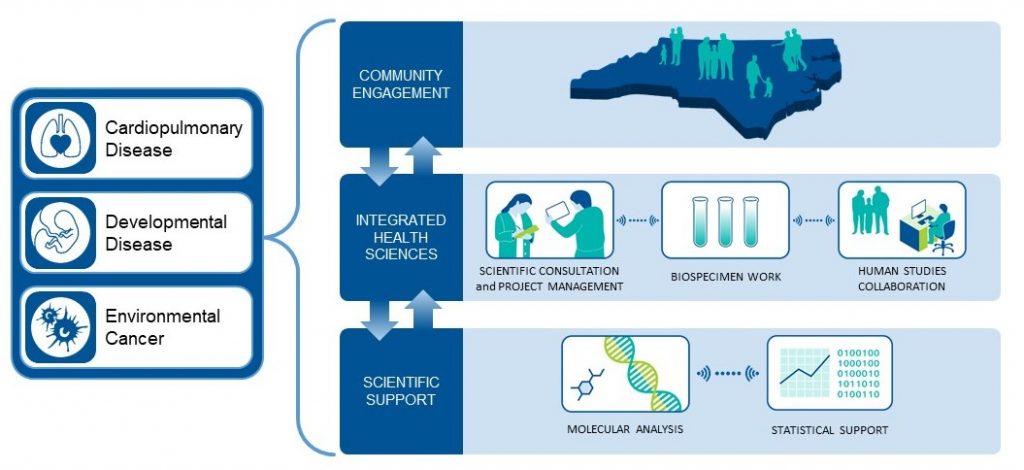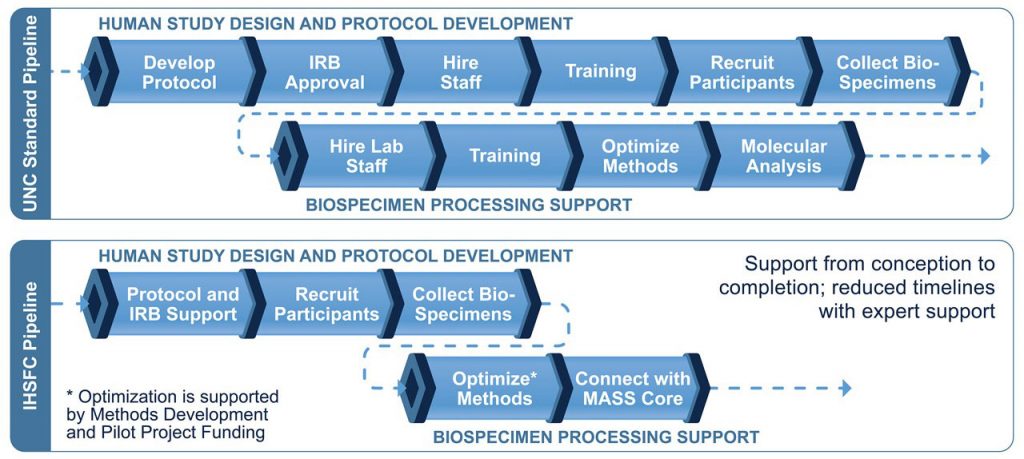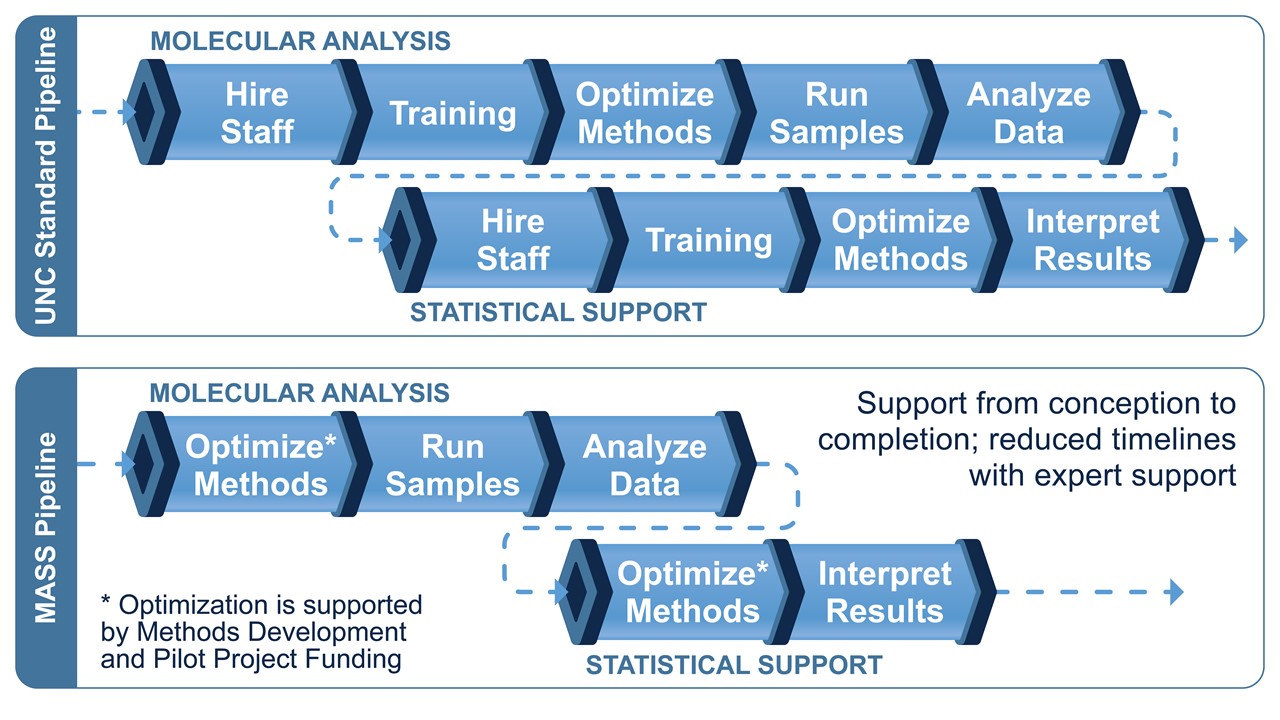CEHS Facility Cores

CEHS Facility Cores network with each other and campus resources to support the Center’s three translational research focus areas.
The Center for Environmental Health and Susceptibility (CEHS) provides valuable services to CEHS members including assistance with study design, project management, IRB, sample analysis, and use of equipment for projects related to cardiopulmonary disease, developmental disease, or environmental cancer.
The sections below describe the types of scientific resources that our program can help coordinate, along with contact information for CEHS facility core and sub-core directors. This list is not meant to be exhaustive. Investigators who are seeking scientific support services, even if those services are not listed here, are encouraged to contact us.
Translational Research Support Core (TRSC)

IHSFC reduces timelines for project implementation by connecting CEHS members with professional scientific support for human studies, patient recruitment, population-based studies, survey research, biospecimen processing.
The Translational Research Support Core (TRSC) facilitates translation of research from laboratory models to human studies.
- The IHSFC reduces timelines for project implementation by connecting CEHS members with professional scientific support for human studies, patient recruitment, population-based studies, survey research, and biospecimen processing.
- The IHSFC serves a broad base of users.
- The IHSFC supports a high-caliber biospecimen processing (BSP) subcore. IHSFC provides concierge services to connect CEHS members with this core, which also responds to CEHS members’ requests for new methods and offers special pricing and prioritization for CEHS members. The IHSFC/BSP subcore provides storage capabilities for CEHS member samples.
- The IHSFC includes a Population Engagement Research Collaboration (PERC) subcore that provides access to a professional staff of trained interviewers and medical record abstractors; and facilitates access to rapid case ascertainment (RCA) through the NC Central Cancer Registry and hospital-based recruitment through the office of clinical and translational research (OCTR).
- The IHSFC seeks opportunities for collaboration with the Community Engagement Core (CEC).
- The IHSFC supports the Pilot Projects Program, meeting with all applicants who have human studies components, assisting with Institutional Review Board approval and protocol development, and connecting members with study resources, technical support, and Facility Cores including the CEC as needed to address community-level project needs.
- The IHSFC supports rigor and reproducibility throughout human studies research by implementing best practices for human studies, through reliance on state-of-the-art biospecimen processing protocols, and through expert, professional staff for patient and participant research contact and communication. These supports are further bolstered by excellence in downstream core facilities, from genomics to bioinformatics and biostatistics. Rigor and reproducibility are supported at all stages of human studies.
For details regarding IHSFC facility core services, please go to Request CEHS Services.
Molecular Analysis and Statistical Support (MASS) Core
The Molecular Analysis and Statistical Support (MASS) Facility Core is a concierge and advanced scientific support core that connects campus-wide networks to offer expertise, technical support, methods development, oversight, and tracking. MASS integrates university services and fills expertise and methods gaps for CEHS members. MASS functions as a research accelerator by providing highly qualified expertise and staffing, together with connections to relevant on-campus services. The MASS reduces time to data collection and interpretation by at least six months.
The two thematic foci of this support unit are Molecular Analysis and Statistical Support.
Molecular Analysis. The molecular analysis needs of CEHS investigators evolve over time and the MASS provides scientific support, networks, negotiated pricing, and priority access for members to utilize a range of University-wide subcores and to support novel methods development to meet members’ needs. The MASS develops new technologies and capabilities within existing cores and negotiates relationships with partner subcores. Three major domains and core-relationships have been sustained over time and are strategically integrated in the current proposal:
- Biomarker Mass Spectrometry (BMS): The BMS subcore offers state-of-the-art mass spectrometry services for exposure assessment and metabolomics. This subcore provides qualitative and quantitative assessment of biomarkers using liquid chromatography and mass spectrometry instrumentation. Mass spectrometry generates data on environmentally-related disease processes and provides ultra-sensitive detection of environmental and endogenous exposure biomarkers. The facility also collaborates with members to develop new assays for targeted biomarker analysis. Equipment available to CEHS members through this facility includes liquid chromatography/ inductively coupled plasma mass spectrometers (ICP-MS), several ultra performance liquid chromatography quadrupole mass spectrometers (UPLC-Q-MS), high performance liquid chromatography (HPLC) for off-line purification of biomarkers from highly complex biological samples, and a Quadrupole Time-of-Flight mass spectrometer (QTOF-MS).
- Pathology Services Core (PSC): The PSC subcore provides superior, state-of-the-art histopathology services and promotes the translation of results between animal models and human populations. The core provides full service support, ranging from basic histology services, including processing, embedding and sectioning of human and rodent formalin fixed paraffin embedded (FFPE) tissues and cell lines, tissue microarray (TMA) construction, chromogenic/ fluorescence single or multiplex immunohistochemistry (IHC) and in-situ hybridization (ISH, FISH) assays. In addition, digital pathology services (slide imaging and image analysis) are offered. Spatial immunoprofiling methods are being developed, with Nanostring Digital Spatial Profiling (DSP) technology available for multiplexed measurement of 60+ immune markers in FFPE tissue sections.
- Office of Genomics Research (OGR): The mission of the OGR is to support comprehensive translational human genomics research. The OGR facility performs sample processing and analyses for molecular, pathologic, and genomic characterization of patient-derived specimens in preclinical research projects and clinical protocols. The lab employs highly automated, as well as manual platforms for reproducible medium-throughput nucleic acid extraction, library preparation, next-generation sequencing, and gene expression profiling of tissues, cells, and blood samples. The goal is to balance rigor and flexibility to meet the needs of academic and clinical research, and to produce optimized and validated processes that are of uniformly high quality for adoption in a clinical lab.
Statistical Support. With support from the UNC Department of Biostatistics, one of the top four departments of biostatistics nationwide, the MASS delivers state-of-the-art support in areas ranging from personalized medicine to clinical trials to epigenetics and covering topics such as study design, power calculations, dose-response analysis, longitudinal data analysis, survival analysis, causal inference, semi-parametric methods, statistical genetics, gene-environment interaction, and bioinformatics. Key features include:
- Integration between data design and acquisition: Through a single, facility core, Statistical Support in the CEHS is integrated with data acquisition (Molecular Analysis), covering the spectrum from animals-to-humans-to-communities. All pilot projects of the CEHS are required to collaborate with the MASS to evaluate their study design and data analysis plan prior to funding. Once data have been collected, the MASS supports data analysis for ongoing studies and strategies for grant proposals.
- Highly-qualified personnel, rapidly mobilized for standardized work flows: The engine for statistical support is highly qualified biostatistical expertise. All biostatistics faculty in the MASS are familiar with standard statistical methods that are frequently used in environmental health sciences, and the MASS maintains a centralized library describing workflow and scripts for standard data analysis. These routine analyses can be supported quickly, and in standardized, rigorous and reproducible workflows and processes.
- Cost-effectiveness: A core facility for statistical needs is efficient, because for many projects, statistical support is needed only intermittently, and the core is more cost-effective than supporting dedicated biostatistics and bioinformatics personnel throughout the project.
- Novel methods development: There are special cases where investigators may require additional support to develop novel statistical methods or data analysis pipelines. MASS Co-Director Dr Haibo Zhou works with a rotational faculty pool to identify appropriate expertise to support individuals with advanced methods development. The expertise of rotational faculty members is broad, with an emphasis on data science and high dimensional data methods.
For MASS Core services, please go to Request CEHS Services.

